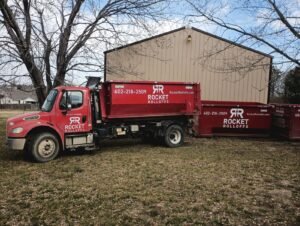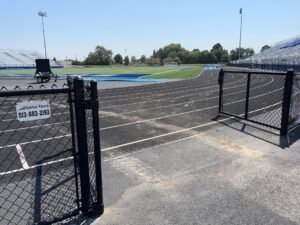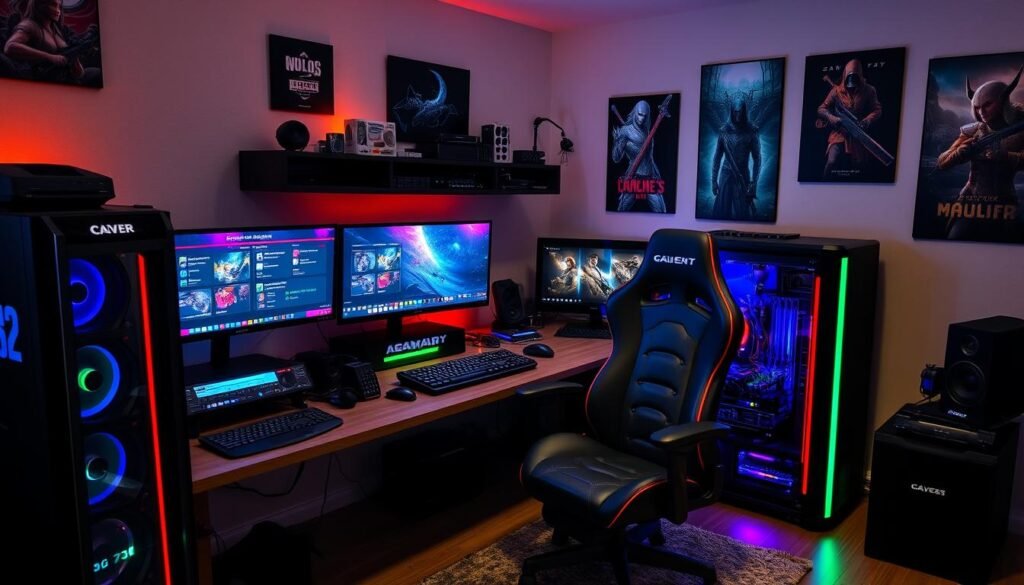
Did you know over 70% of gamers like hosting their own servers? They want a customized experience that dedicated servers offer. This guide is for beginners who want to start their own gaming server.
Hosting your own server makes your gaming better. You get more control and better performance. We’ll cover everything you need to know. This includes understanding server types, choosing hardware, and picking software.
Understanding Gaming Servers
Gaming servers are special platforms for hosting multiplayer online games. They let players connect and play together, making games more fun. Knowing about different gaming servers is key for a great gaming experience.
What is a Gaming Server?
A gaming server is a computer system made just for online games. Players join the server for a smooth game experience. The server keeps track of game data and player actions, affecting how well the game runs.
Types of Gaming Servers
There are many types of gaming servers, each for different needs. Here are a few main ones:
- Dedicated Servers: These offer top performance and reliability for a premium gaming experience. They have all the resources needed for big player groups and run demanding games well.
- Virtual Private Servers (VPS): VPSs are a good balance of cost and performance. They’re perfect for smaller groups. You can customize them to fit your budget while still getting good performance.
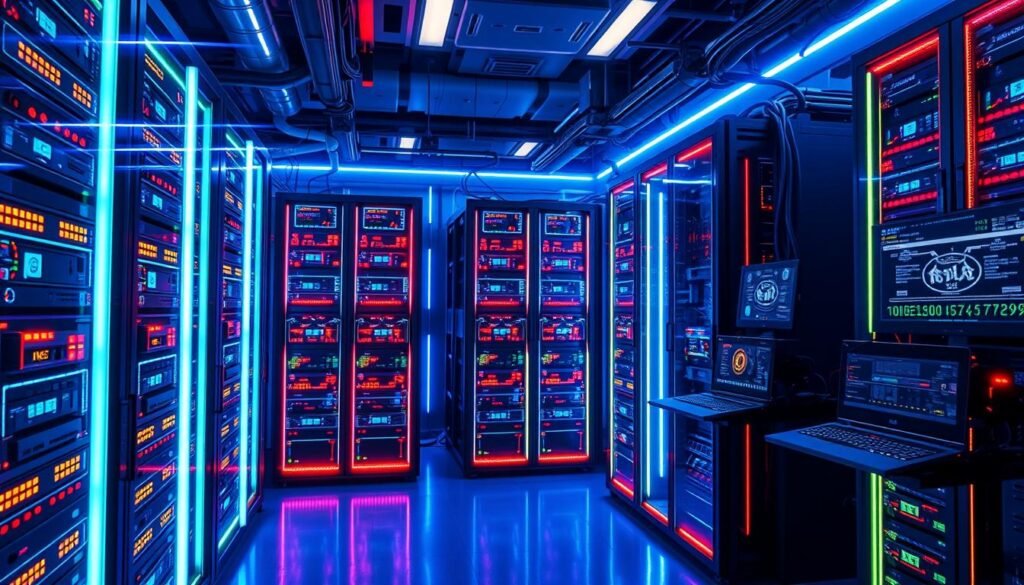
Benefits of Hosting Your Own Gaming Server
Hosting your own gaming server offers many benefits. Players can customize game settings and improve performance. This makes the game more enjoyable and tailored to their needs.
Control Over Game Settings
One big advantage is the control over game settings. You can change rules, set player limits, and tweak gameplay features. This creates a unique gaming atmosphere that players love.
Enhanced Performance and Stability
Another great benefit is the enhanced performance and stability. Self-hosted servers are faster and more reliable than public ones. Players get lower latency, less lag, and a smoother game. This is crucial during busy times when many players are online.
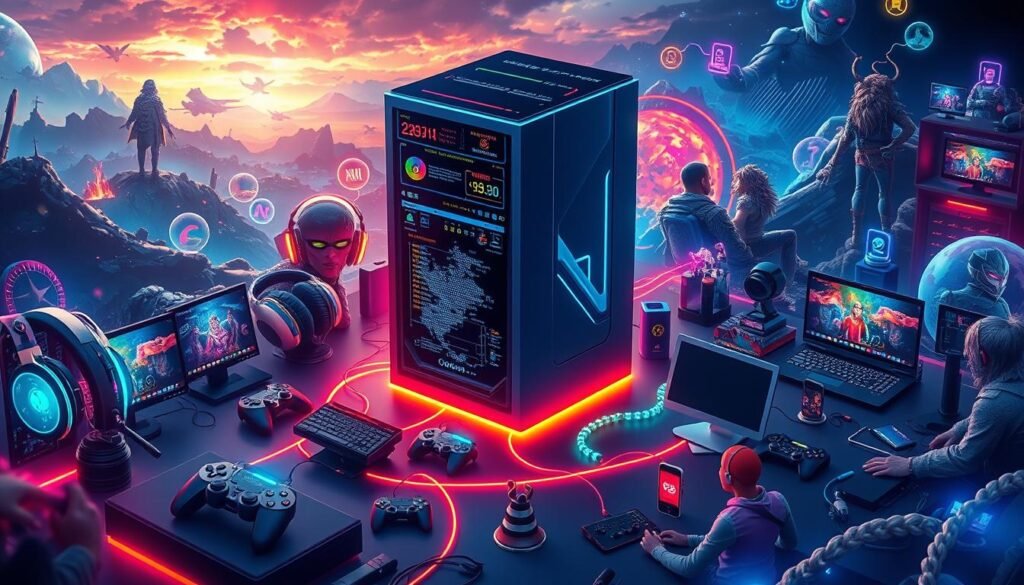
Choosing the Right Hardware for Your Server
When you set up a gaming server, picking the right hardware is key. High-performance servers need specific parts to handle lots of players and game data. Knowing what these parts are can make choosing easier.
Essential Components for High-Performance Servers
To create a strong gaming server, focus on a few important parts:
- CPU: Choose a powerful processor like the AMD Ryzen series or Intel Core i7/i9. These are top choices for gaming servers.
- RAM: You’ll need at least 16GB of RAM. This ensures smooth gameplay, even with many players.
- Storage: Use Solid State Drives (SSDs) for fast loading times. Also, get larger Hard Disk Drives (HDDs) for more data as your server grows.
- Network Interface: A Gigabit Ethernet card is crucial for handling lots of data and reducing lag.
Recommended Specifications for Beginners
If you’re just starting, look for affordable yet efficient options. Here are some good starting points:
| Component | Recommended Specifications |
|---|---|
| CPU | AMD Ryzen 5 3600 or Intel Core i5-10400 |
| RAM | 16GB DDR4 |
| Storage | 500GB SSD + 1TB HDD |
| Network | Gigabit Ethernet |
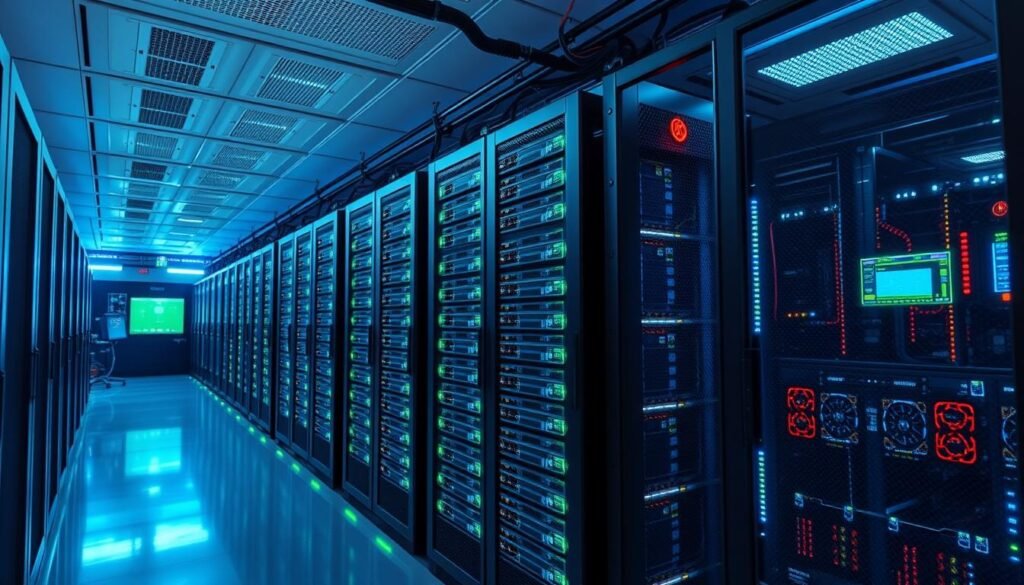
Game Selection for Your Server
Choosing the right games is key to a successful gaming server. The games you pick can really engage your players. Popular multiplayer games can attract more players and make the experience better.
Popular Multiplayer Games
Some top multiplayer games for private servers are:
- Minecraft
- ARK: Survival Evolved
- Counter-Strike: Global Offensive
- Rust
- Grand Theft Auto V Online
These games have big communities and allow for lots of customization. This can really improve the player’s experience.
Considerations for Game Type and Server Demand
When picking games, think about a few things. First, look at server demand. Knowing what games are popular can help draw players. Also, consider:
- Player preferences: What games do players like?
- Community support: Is there a strong community for mods and updates?
- Technical requirements: Can your hardware handle the chosen games?
Thinking about these points can help your server last longer and keep players coming back. Choosing games wisely is crucial for success.
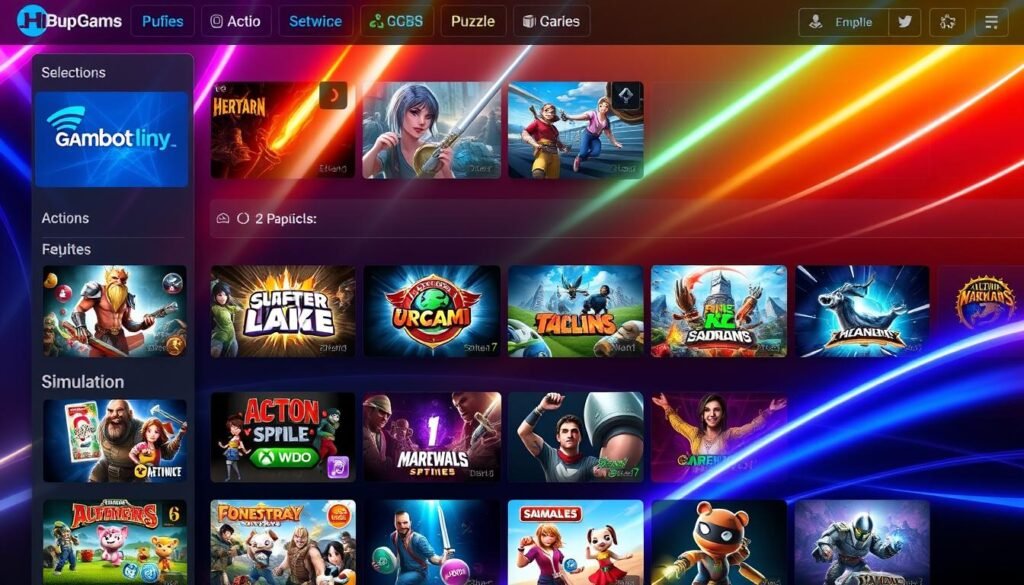
Selecting the Best Server Hosting Option
Choosing the right hosting for your gaming server is key. You have three main options: dedicated servers, virtual private servers, and cloud gaming. Each has its own benefits and things to consider, fitting different needs and budgets.
Dedicated Servers vs. Virtual Private Servers
Dedicated servers give you all the hardware to yourself. This means better performance, security, and more control. Virtual private servers (VPS) share hardware but still offer a good amount of performance. They’re a cheaper option but still pack a punch.
| Feature | Dedicated Servers | Virtual Private Servers |
|---|---|---|
| Performance | High – full access to resources | Moderate – shared resources |
| Cost | Higher | Lower |
| Security | Very High – exclusive environment | Moderate – isolation from other users |
| Control | Complete server control | Customizable within limits |
Cloud Gaming Solutions for Beginners
Cloud gaming is a hit with beginners. It lets you play games on remote servers, so you don’t need expensive gear. It’s easy to set up and perfect for those new to gaming servers.
With cloud gaming, you get scalability and easy access. It’s great for casual gamers who want to dive in without needing to know a lot about tech.

Setting Up Your Gaming Server Software
Choosing the right gaming server software is key for a fun multiplayer experience. Knowing how to install it helps beginners get their server up and running. We’ll cover the steps to install and some useful software packages to boost server performance.
Steps to Install Server Software
The journey starts with picking the right gaming server software. Here’s how to begin:
- Find software that fits your game and server needs.
- Download the installer from the software provider’s official site.
- Run the installer and follow the instructions. Agree to the licensing terms.
- Choose where to install it or use the default location.
- Set up initial settings for the best performance.
- Finish the installation and start the server to check if it works.
Useful Tools and Software Packages
Using the right tools can make managing your server and playing games better. Here are some top picks:
| Software Package | Purpose | Key Features |
|---|---|---|
| Multicraft | Game Server Management | User-friendly interface, automated backups, mod support |
| SteamCMD | Game Installation and Updates | Command-line interface, fast downloads, supports multiple games |
| Pterodactyl | Game Server Panel | Web-based management, API integration, real-time resource monitoring |
| Ark Servers | Ark: Survival Evolved Hosting | One-click install, customizable settings, community support |
Configuring Your Gaming Server
Setting up your gaming server needs careful attention to many settings. Making sure your server runs well is key. It supports many players and makes their experience better. Important areas include network settings, firewall rules, and user permissions.
Setting Up Basic Configurations
Start with the basic server setup. Important settings include:
- Network Configuration: Give a static IP address to avoid connection problems.
- Firewall Settings: Change firewall rules to let in game traffic.
- Port Forwarding: Open needed ports on your router for game access.
- User Permissions: Create the right access levels for players and admins.
Optimizing Server Settings for Performance
To make the gaming experience better, optimize server settings. This boosts performance and cuts down on delays. Here are some tips:
- Adjusting Tick Rate: Raise the server tick rate for smoother play.
- Memory Management: Give enough RAM based on player numbers.
- Plugin Optimization: Turn off plugins that use too many resources.
- Monitoring Tools: Use tools like htop or Netdata to track performance live.
Managing Your Gaming Server
Managing your gaming server well is key to keeping it running smoothly. This part will talk about important maintenance tasks and how to keep an eye on server performance. These steps help make sure everyone has a great gaming experience.
Routine Maintenance Tips
Keeping your gaming server in top shape is crucial. It helps avoid sudden problems and keeps the server up and running. Here are some routine tasks to consider:
- Software Updates: Keep the server software and game files up to date. This brings new features and security fixes.
- Backup Data: Back up the server data often. This protects against losing important information.
- Check Server Logs: Look at server logs to find any odd activity or errors.
- Optimize Server Settings: Adjust server settings regularly. Do this based on what players say and how they use the server.
Monitoring Server Performance
Keeping an eye on server performance is important. It helps catch problems early. Here are some ways to monitor server performance better:
- Use Monitoring Tools: Use special tools to watch server metrics like CPU usage, memory, and network speed.
- Set Alerts: Set up alerts for big performance issues. This way, you can act fast if needed.
- Player Feedback: Listen to what players say. Use their feedback to see if the server needs changes.
- Regular Performance Reviews: Check server performance data often. Look for trends and make changes as needed.
| Routine Maintenance Tasks | Importance | Frequency |
|---|---|---|
| Software Updates | Ensures security and access to new features | Weekly or Monthly |
| Backup Data | Prevents data loss in case of failure | Daily or Weekly |
| Check Server Logs | Helps identify potential issues | Weekly |
| Optimize Server Settings | Improves performance based on user experience | Monthly |
| Use Monitoring Tools | Tracks performance in real-time | Continuous |
Understanding Server Security Considerations
Keeping your gaming server safe is key. It protects against many threats. By using different security steps, you make a safe place for gamers. Knowing common dangers helps you act fast to prevent them.
Implementing Security Measures
To make your server more secure, try these steps:
- Firewalls: They block bad traffic, keeping your server safe from the internet.
- Anti-DDoS Protection: This stops attacks that slow down your server and game play.
- Regular Updates: Keeping your server’s software and plugins up-to-date helps avoid known problems.
- Access Controls: Limiting who can change settings keeps your server safe from unauthorized access.
Common Vulnerabilities to Avoid
Knowing your server’s weak spots is crucial. Here are some common issues:
- Unpatched Software: Not updating your server can let attackers in.
- Weak Passwords: Strong passwords stop hackers from getting in.
- Misconfigured Settings: Wrong server settings can leak important data; check them often.
- Open Ports: Unused ports are easy targets for hackers; close them when not needed.
Connecting Players to Your Server
Creating a gaming community starts with connecting players to your server. This involves several steps to ensure everyone has a great time. It’s important to share your server address and IP to make gaming smooth for all.
Inviting Friends and Setting Permissions
The first step is inviting friends to your server. Share your server address, including the IP and port number if needed. After friends join, setting the right player permissions is key. This lets you control gameplay, making sure everyone has a fair experience.
Using Server Address and IP
The server address and IP are crucial for joining your server. They help players connect to the right server. Here’s how to connect:
- Open the game client.
- Navigate to the “Join Server” option.
- Input the server address in the provided field.
- Confirm connection to establish gameplay.
By managing player permissions and making your server address easy to find, you create a welcoming space. This encourages teamwork and fun among gamers.
| Step | Description |
|---|---|
| 1 | Share the server address with players. |
| 2 | Players enter the server address in the game client. |
| 3 | Manage player permissions to enhance gameplay experience. |
| 4 | Facilitate connections and monitor for smooth interaction. |
Using Game Hosting Services
For gamers looking for an easy server experience, game hosting services are a great choice. They offer managed hosting, which lets users enjoy their games without worrying about server management. It’s important to know the benefits and make the right choice among different hosting providers.
Benefits of Managed Hosting
Managed hosting has many advantages:
- Expert Support: You get help from tech experts, making it easier to solve problems and enjoy your games.
- Automatic Updates: Servers are updated automatically, keeping your games safe and running smoothly.
- Scalability: You can easily add more resources as your player base grows, without hassle.
- Optimized Performance: Servers are set up for specific games, giving you the best performance possible.
Comparing Popular Game Hosting Providers
When picking a game hosting provider, look at price, features, and what other users say. Here’s a table comparing some well-known providers:
| Provider | Price per Month | Server Locations | Features Included |
|---|---|---|---|
| Apex Hosting | $6.49 | Multiple Locations Worldwide | Instant Setup, DDoS Protection |
| Host Havoc | $15.00 | North America, Europe | 24/7 Support, Custom Control Panel |
| GG Servers | $3.00 | North America, Europe, Australia | Mod Support, Automatic Backups |
| ScalaCube | $2.50 | Worldwide Locations | Free Subdomain, Instant Setup |
Choosing the right game hosting service is key for a great gaming experience. By looking at managed hosting, gamers can find a provider that meets their needs.
Server Rental Options for Beginners
For new gamers, renting a server is a great choice instead of hosting one yourself. It makes starting a server easy, letting you play without worrying about the tech. Knowing when to rent based on your budget and game needs is key.
When to Consider Renting a Server
Renting a server has many benefits:
- Budget Constraints: It’s cheaper than buying your own hardware.
- Game Type: Some games need special settings for the best play. Renting gives you access to these.
- Time Investment: If you don’t want to deal with setup, renting is easy.
Cost Considerations of Server Rental
It’s important to understand the costs of renting a server. Different companies offer different plans:
| Provider | Monthly Cost | Player Slots | Features Included |
|---|---|---|---|
| GameServers.com | $19.99 | 10 | 24/7 Support, SSD Storage |
| HostHavoc | $15.00 | 20 | Automated Backups, DDoS Protection |
| OVHcloud | $25.00 | 32 | Advanced control panel, Free setup |
Looking at these costs helps beginners pick a plan that’s right for their budget and gaming needs.
Steps to Troubleshoot Common Server Issues
Server problems can ruin the fun for gamers. Knowing how to fix these issues is key to a smooth game. By spotting common errors early, server teams can keep everyone connected without a hitch.
Identifying Common Errors
Spotting common server problems is the first step. Some common issues include:
- Server crashes due to too much traffic
- Players getting timed out
- Server settings not set right
- Not enough bandwidth causing slow performance
Knowing these issues helps find the main problem fast.
Fixing Lag and Connectivity Problems
There are ways to tackle lag. Here are some steps to try:
- Check Server Load: See how many users are online and if the server can handle it.
- Reboot the Server: A simple restart can fix many lag problems.
- Optimize Server Settings: Make sure settings are for the best performance. Adjust bandwidth if needed.
- Router and Network Checks: Make sure the internet is stable and the server’s network is okay.
By taking these steps, server teams can cut down on lag and improve connections. This means players can enjoy their games without interruptions.
Optimizing Your Server for Low Latency
In multiplayer gaming, low latency is key for a smooth experience. Latency is the delay between a player’s action and the server’s response. High latency can cause lag, making gameplay frustrating and less competitive. So, improving server performance is crucial for any gaming server admin.
Importance of Latency in Multiplayer Gaming
Knowing about latency is important for keeping players engaged. Low latency servers make actions seem instant, boosting enjoyment and competition. Lowering latency improves responsiveness, letting players make quick, important moves.
So, it’s important to always check and improve latency.
Techniques to Achieve Low Latency
There are many ways to get low latency in gaming servers:
- Server Location: Pick a server near your players. The closer, the less latency.
- Bandwidth Optimization: Make sure your network can handle lots of traffic. A good network makes servers more responsive.
- Regular Maintenance: Regularly check and update your hardware and software to avoid latency problems.
- Utilization of Low Latency Protocols: Use protocols like UDP for faster communication, reducing lag.
- Resource Allocation: Use server resources wisely to keep gameplay smooth, even when it’s busy.
Using these methods, admins can greatly improve server performance. This ensures a great experience for all players. Making low latency a priority is essential in today’s fast-paced gaming world.
Advanced Features for Dedicated Gaming Servers
Dedicated gaming servers have many features that make gaming better. Adding mods and add-ons can make games more varied and fun. Server plugins also add new features, making games more exciting for players.
Introducing Mods and Add-ons
Mods and add-ons are key for more gaming options. They let players change their game, adding new items or worlds. By using popular mods, servers can stand out and offer unique experiences.
Using Plugins for Enhanced Gameplay
Server plugins are great for better gameplay. They help manage players, track stats, and add new features. Some benefits include:
- Improved Game Management: Plugins make managing players easier and help enforce rules.
- Customization Options: They allow for unique gameplay experiences based on what players like.
- Performance Enhancements: Some plugins make servers run smoother, reducing lag.
Conclusion
Starting a gaming server is exciting and rewarding for beginners. It boosts your tech skills and creates a fun multiplayer experience with friends. This guide has given you all the info you need to set up a great gaming server.
Remember, keeping your server running smoothly is crucial. Regular updates and tweaks are essential for a good gaming experience. The tips on server performance and managing users will help you build a lively community.
This journey turns your gaming into a team effort. With the right tools and knowledge, you can create a vibrant gaming community. It’s a place where creativity and strategy thrive.



